

Panicked about Kids’ Addiction to Tech? Discussing 6 Historical Quotes About ... Digital Citizenship Practices? Did you know digital citizenship practices were being talked about long before the Internet was ever a thing?
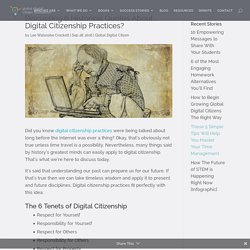
Okay, that’s obviously not true unless time travel is a possibility. Nevertheless, many things said by history’s greatest minds can easily apply to digital citizenship. That’s what we’re here to discuss today. It’s said that understanding our past can prepare us for our future. Promote Digital Inclusion and Stop Online Bullies. Technological advancements have provided educators with a number of tools and opportunities they didn’t have five, 10, or 50 years ago.
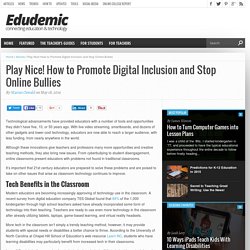
With live video streaming, smartboards, and dozens of other gadgets and lower-cost technology, educators are now able to reach a larger audience, with less funding, from nearly anywhere in the world. Although these innovations give teachers and professors many more opportunities and creative teaching methods, they also bring new issues. From cyberbullying to student disengagement, online classrooms present educators with problems not found in traditional classrooms. It’s important that 21st century educators are prepared to solve these problems and are poised to take on other issues that arise as classroom technology continues to improve. Tech Benefits in the Classroom.
The Immortal Myths About Online Abuse — Humane Tech. If your website (or app!)
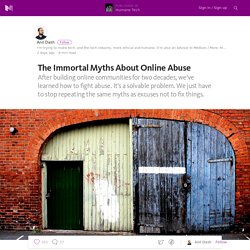
Is full of assholes, it’s your fault. The bottom line, as I wrote half a decade ago, is that if your website is full of assholes, it’s your fault. Same goes for your apps. The dark side of Guardian comments. Comments allow readers to respond to an article instantly, asking questions, pointing out errors, giving new leads.
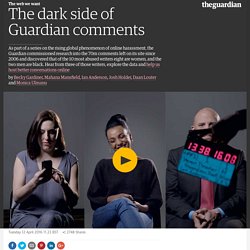
At their best, comment threads are thoughtful, enlightening, funny: online communities where readers interact with journalists and others in ways that enrich the Guardian’s journalism. But at their worst, they are something else entirely. The Guardian was not the only news site to turn comments on, nor has it been the only one to find that some of what is written “below the line” is crude, bigoted or just vile. Managing your personal e-reputation. The Digital Lives of Teens: Turning "Do As I Say" into "Do As I Do"
The old saying "Do as I say, not as I do" could not apply more to adults when dealing with kids and technology.
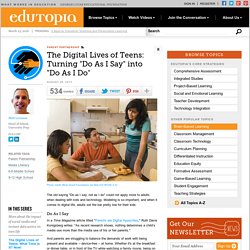
What It's Like to Be a 13-Year-Old on Social Media Today. This post has been adapted and excerpted from Nancy Jo Sales’s new book, “American Girls: Social Media and the Secret Lives of Teenagers,” on sale now from Knopf.

She is also the author of “The Bling Ring: How a Gang of Fame-Obsessed Teens Ripped Off Hollywood and Shocked the World.” Pay Attention to Your Digital Footprint. “Your digital footprint paints a portrait of who you are as an educator, leader, school, or district.
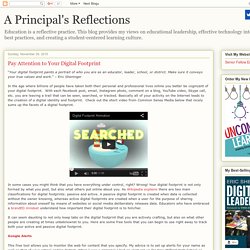
Make sure it conveys your true values and work.” – Eric SheningerIn the age where billions of people have taken both their personal and professional lives online you better be cognizant of your digital footprint. With each Facebook post, email, Instagram photo, comment on a blog, YouTube video, Skype call, etc. you are leaving a trail that can be seen, searched, or tracked. Basically all of your activity on the Internet leads to the creation of a digital identity and footprint. Check out the short video from Common Sense Media below that nicely sums up the facets of a digital footprint.In some cases you might think that you have everything under control, right? Wrong! I Can’t Do Much About Internet Spam. There is little escape from the annoyance of unwanted email blog comments, and now, spam scented twitter messages.

I have long metaphorically associated them with Periplaneta americana. We can all collectively thank Google ranking algorithms for creating the incentive. But the great engineering minds at the Plex have not sat idle, they giveth us the ref=”nofollow” attribute while piling up the ad revenue. Building Social Skills, Alone at a Computer — Bright. A new online game purports to teach social and emotional skills to students, battling the ill effects of overexposure to technology.
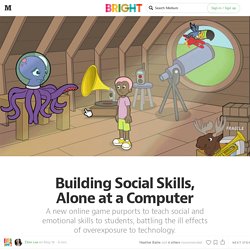
Etiquette for Kids in the Digital Age. Via CyberWise.org Etiquette is a code of behavior that defines expectations for social behavior.
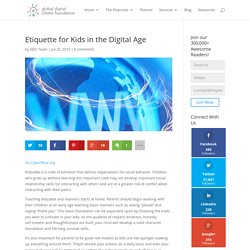
Children who grow up without learning this important code may not develop important social relationship skills for interacting with others and are at a greater risk of conflict when interacting with their peers. Teaching etiquette and manners starts at home. Parents should begin working with their children at an early age teaching basic manners such as asking “please” and saying “thank you.” This basic foundation can be expanded upon by choosing the traits you wish to cultivate in your kids. Digital Irony - new post on Learn, do teach. #ETL523. Why it is wrong to call Siri a bitch. Why Being Young Doesn't Make You a Social Media Expert.
Rebecca Levey is a co-founder of KidzVuz.com, a video review site by and for tweens. She writes about technology and education at Beccarama and is a White House Champion of Change for Education. Follow her at @beccasara.